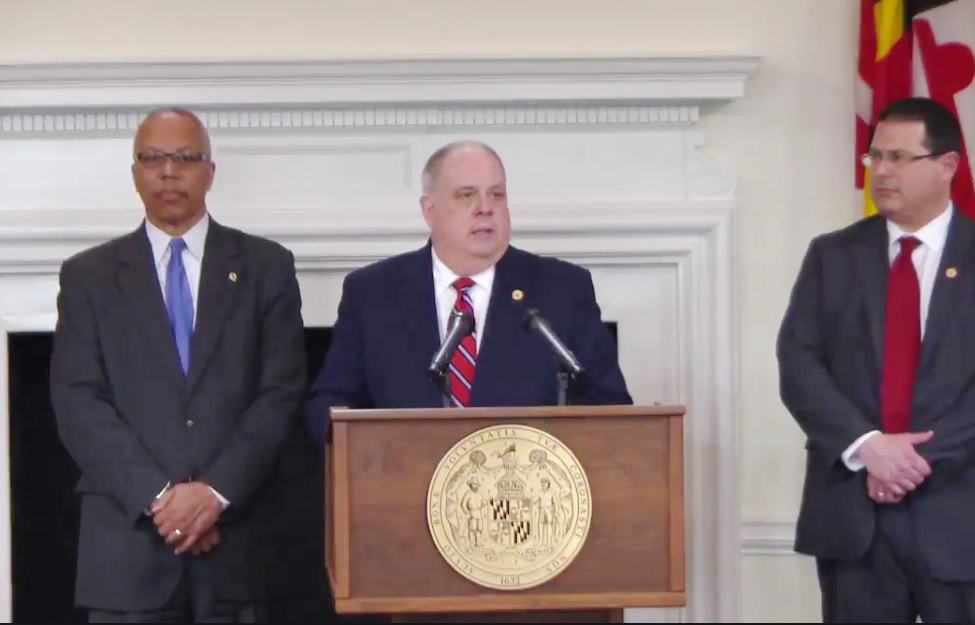Maryland paid sick leave bill ‘dead on arrival’
Gov. Larry Hogan tells reporters he will veto “terrible” sick leave bills, flanked by Lt. Gov. Boyd Rutherford, left, and Chief Legislative Officer Christopher Shank. From Governor’s Office video
By Len Lazarick
[email protected]
The paid sick leave bills making their way through the legislature “are dead on arrival” if they reach his desk, Gov. Larry Hogan declared Wednesday. He promised reporters “I will veto them immediately” because they have the potential to kill thousands of jobs and “are disastrous for our economy.”
He called the legislation that has passed the House and a Senate version likely to pass this week partisan attempts “to put points on the board and use them against me in the campaign” for his reelection next year.
Hogan favors his own plan that mandates paid leave for employers having more than 50 employees, and offers tax incentives for smaller employers who offer at least 40 hours of leave per year.
“Our proposal actually has the potential to cover far more people,” Hogan said. “Nobody in this room has ever talked about that,” referring to more than a dozen reporters at the press conference.
Does Hogan bill cover more people?
The House and Senate versions of the bills, HB1 and SB230, differ in how many hours and days are covered, but both bills mandate paid sick leave for businesses with more than 15 employees. Businesses with fewer than 15 employees must offer unpaid leave for covered employees. Any business that offers at least some kind of paid leave — vacation, personal, sick or disability — for five or six days is already in compliance with the new mandate.
Instead of a mandate, Hogan’s bill — SB305 — offers tax incentives to some businesses with less than 50 employees who provide paid leave. But it does not cover all employers, only those which are “pass-through entities” such as sole proprietors, partnerships, Chapter S corporations and limited liability companies.
The Hogan bill does not offer incentives to small nonprofit corporations, small stock corporations or businesses that are losing money. And it does not offer tax breaks for business owners that make too much money — $200,000 for an individual or $250,000 for a couple.
Tax breaks cost $60 million
Hogan’s tax incentives have been loosely called “tax credits,” as Chief Legislative Officer Christopher Shank did at a Senate hearing on Hogan’s measure, but they are actually “subtraction modifications.” They exempt the first $20,000 in income from Maryland taxes, potentially about $1,700 in tax breaks, according to a Hogan aide. This break would go even for small businesses that have long been offering paid sick leave to employees.
These tax breaks for pass-through entities in exactly those amounts proposed by Hogan were the top recommendation of the legislature’s Augustine Commission last year, Hogan’s aides have emphasized. But the commission’s recommendation was an attempt to reduce Maryland’s high personal tax rates that make the state less competitive for business owners, and were unrelated to sick leave or employee benefits.
The tax incentives in Hogan’s bill are estimated to cost the state $60 million a year in lost revenues, according to legislative analysts, who said, “This bill establishes a new entitlement.”
The mandates in the House and Senate bill cost the state little but put an additional burden on employers who are not currently offering paid sick leave. This leads Hogan to charge they could kill thousands of jobs.
The Hogan bill, which is half the length of the legislature’s proposals, also provides less regulation, less protections for employees who file a complaint and lower penalties than the House and Senate bills, and totally exempts all collective bargaining agreements. The legislature only exempts construction industry labor contracts and agriculture, also exempted in the Hogan bill.
Labor Secretary Kelly Schulz told the Senate committee last month that the Hogan bill “addresses the needs of every employee in the state.”
The Hogan bill could encourage very small employers to offer paid sick who might only provide unpaid leave in the legislative mandate. But it also clearly does not offer incentives to other employers who don’t pay taxes or already pay high taxes.

MarylandReporter.com is a daily news website produced by journalists committed to making state government as open, transparent, accountable and responsive as possible – in deed, not just in promise. We believe the people who pay for this government are entitled to have their money spent in an efficient and effective way, and that they are entitled to keep as much of their hard-earned dollars as they possibly can.

